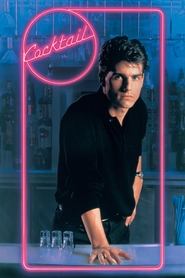— Just as long as you don't get too fat.
Check please. Anyway, I know reading homosexual subtext into Tom Cruise movies has been clichéd since the week after the release of Top Gun, but when your best buddy keeps sabotaging your plans with women, you should probably start to take notice.
Sober since August 1979, it's funny to read Roger Ebert's contemporary review of the film in which, inter alia, he finds it remarkable "how little the movie knows about bars or drinking". I'd probably rather watch this film than drink any of those drinks, mind you.
One of the weirdest things about Cocktail is the so-called message it thinks it contains. Cruise is painted throughout the film as a cynical, success-oriented 1980s materialist who wants only to meet a rich woman and own his own bar. That's why Shue doesn't tell him at first that she's rich. Toward the end of the movie, there's a scene where he allegedly chooses love over money, but then, a few months later, he is the owner and operator of his own slick Manhattan singles bar. [It] costs a fortune to open a slick singles bar in Manhattan, and so we are left with the assumption that Cruise's rich father-in-law came through with the financing. If the movie didn't want to leave that impression, it shouldn't have ended with the scene in the bar. But then this is the kind of movie that uses Cruise's materialism as a target all through the story and then rewards him for it at the end. The more you think about what really happens in Cocktail, the more you realize how empty and fabricated it really is.
Synopsis: After being discharged from the Army, Brian Flanagan moves back to Queens and takes a job in a bar run by Doug Coughlin, who teaches Brian the fine art of bar-tending. Brian quickly becomes a patron favorite with his flashy drink-mixing style, and Brian adopts his mentor's cynical philosophy on life and goes for the money.

